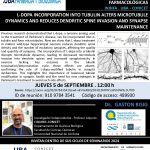5 de septiembre de 2024
L-DOPA INCORPORATION INTO TUBULIN ALTERS MICROTUBULE DYNAMICS AND REDUCES DENDRITIC SPINE INVASION AND SYNAPSE MAINTENANCE.
Dr. Gaston Bisig. Investigador Independiente, Profesor Adjunto, CIQUIBIC-CONICET, Departamento de Química Biológica, Facultad de Ciencias Químicas, Universidad Nacional de Córdoba.
Resumen del seminario
Previous research demonstrated that L-dopa, a tyrosine analog used in the treatment of Parkinson's disease, can be incorporated into α-tubulin and form microtubules. Now we show that L-dopa treatment in mature wild-type hippocampal neurons reduces dendritic spine density and the number of excitatory synapses, affecting the quality and quantity of synapses. The incorporation of L-dopa into α-tubulin disrupts microtubule dynamics, leading to decreased microtubule invasion into dendritic spines and increased synaptotoxicity. In neurons lacking key enzymes in the tubulin tyrosination/detyrosination cycle, these effects are absent, confirming the role of L-dopa-modified tubulin in synaptic dysfunction. This highlights the importance of balanced tubulin modification in synaptic health and the need for new strategies in Parkinson's treatment to avoid such side effects.
Mas información
https://ciquibic.org.ar/bisig-c-gaston/
Papers relevantes
- Cambiasso MY, Gotfryd L, Stinson MG, Birolo S, Salamone G, Romanato M, Calvo JC, Fontana VA. Irreversible incorporation of L-dopa into the C-terminus of α-tubulin inhibits binding of molecular motor KIF5B to microtubules and alters mitochondrial traffic along the axon. Neurobiology of disease. 2021 Jan;147:105164. doi 10.1016/j.nbd.2020.105164.
